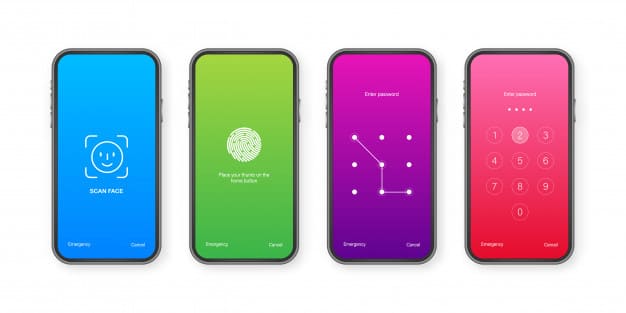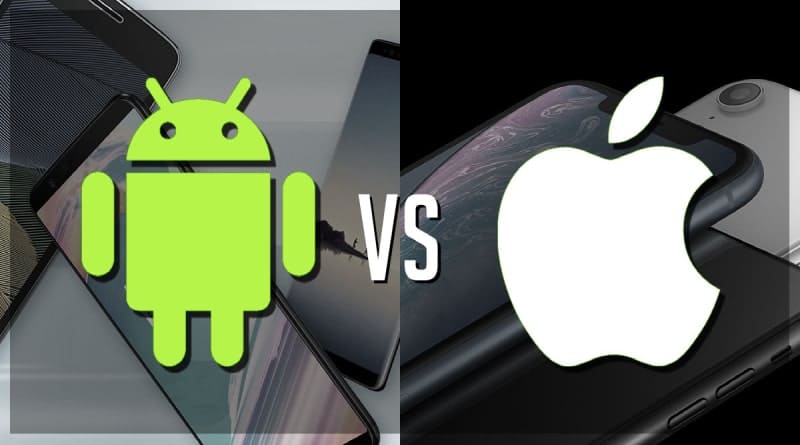There has been a constant debate between the two major mobile application development platforms, Android and iOS. Both these platforms contribute to an increase in customer engagement and improve productivity.
According to Electro IQ, the global mobile operating system market was dominated by Android, that holds about 70.69% share in the first quarter of 2025. Meanwhile, iOS is estimated at around 28.58%. In the United States, the share is very high with 60.77% iOS, whereas Android stands at 38.81%.
According to TechJury’s report, in India, the penetration of Android dominates with about 95.21% of the market share as compared to iOS. These indicate that the deployment of mobiles globally and local adaptation varies immensely.
For business owners and entrepreneurs aspiring to multiply their investments, it becomes tough to figure out the right strategy to double their ROI. In order to start, survive, and thrive as an enterprise, it is crucial to be available on all possible platforms, as your users may be using both Android and iOS.
The two major operating systems want to unlock their value and deliver relevant and personalized experiences to their customers. So now, you might be thinking about choosing – Android or iOS app development. Well, here in this article, we will take you through Android vs iOS app development and look at the major differences along with their pros and cons. It will make you distinguish between both and thus help you in choosing the most appropriate mobile app development solution for your business. Let’s get going.
Related: Apt Website Designing and Development Tools
Table Of Content
Difference Between Android App Development vs iOS App Development: Which One is Best for You?
Each platform comes with its own peculiarities, but ultimately, the decision of investing in an iOS or Android app development company narrows down to the following five factors:
- Target Audience
- Development Time
- Desired App Features
- App Maintenance
- Monetization and Revenue Goals
All these factors will be discussed further! Let’s first learn about the tech ecosystems as well as the pros and cons of each platform.
Android vs. iOS App Development – Tech Stack
Android App Development
Android app developers use Java, C++, and Kotlin to develop Android applications. Some of the advanced Google development tools that Android developers use include:
- Android Jetpack – It consists of various pre-built Android components
- Firebase – It is a complete mobile application development platform
- Android SDK – It is an integrated development environment (IDE) that comes with Android Studio.
iOS App Development
In comparison to Android, iOS has a closed system, meaning that iOS applications work on Apple devices only. To create iOS apps, developers might use Objective-C or Swift. Here are some of the iOS app development tools that developers use:
- iOS SDK – It comes with the Cocoa Touch UI development framework that provides various graphical features, user interface controls, etc.
- XCode – It is the official IDE for iOS application development.
- Swift Playgrounds – It is an extensive development environment for Swift.
- TestFlight – It is an online service that installs and tests the app over the air. Using this online service, developers can test your iOS apps and obtain valuable feedback before the app is published.
Android vs. iOS App Development – Pros and Cons
Pros of Android App Development
- Open Ecosystem – Android has open-source code. Therefore, Android app developers enjoy more features than iOS app developers.
- UI Design – Developers implement extensive Google design guidelines to create an intuitive user interface.
Read: 4 Things to Consider for a Good UX on Android
- Launch – Unlike iOS, Android apps are much easier to publish on Google Play Store. The whole app publishing process may take only a few hours.
- Fragmentation – Even though fragmentation may be considered a drawback, you can develop apps for a variety of devices including TVs, wearables, in-car systems, and many others.

Cons of Android App Development
- Testing – Since there is a diverse range of Android devices and versions, QA specialists may take more time to test Android apps.
- Fragmentation – As discussed earlier, fragmentation may also be considered a disadvantage. Because of the fact that Android devices come in various app screen sizes, resolutions, etc., Android developers may take a long to make app features compatible with particular devices.
- Expensive – The longer it takes to develop and test the apps, the higher will be the cost of your Android app. Besides, the development cost also depends on the features, design, and complexity of your app.
Pros of iOS App Development
Revenue – It’s no more a surprise that Apple users tend to spend more money on app purchases than Android users. So, you have higher chances of boosting your revenue.
- Limited Number of Devices – Since iOS powers only Apple devices, your app will perfectly fit the limited number of app screens, resolutions, and devices.
- UI Design – iOS app developers use a comprehensive style guide for creating the app’s UI. So, they can develop iOS apps in a short time, thereby making iOS app development more affordable.

Cons of iOS App Development
App Release – The App Store is very strict when it comes to the quality and security of iOS apps and thus, has very stringent app review guidelines. So, there are chances that the App Store may not give approval to your app due to a lack of valuable content, security issues, or poor app performance. Other than this, the iOS developer needs to submit the app for real-life testing, which takes another couple of days.
Flexibility – It’s quite difficult to customize iOS apps because the platform comes with several restrictions.
Android vs. iOS App Development – Key Comparison Factors
1. Target Audience
Android currently dominates the global platform share. This market share involves many developing countries and lower-income regions. Apple, on the other hand, dominates the App Store for customer spending.
So, before you hire Android or iOS app developers, make sure you know your target audience. If you’re planning to target a broad global audience, then you should hire Android app developers. If you’re targeting affluent countries like Western Europe or North America and if you’re planning to build an eCommerce or enterprise-level app, then
- Apple can be your best bet.
- Android is an Ideal Choice for Audience in Developing Markets
- Android holds a lion’s share in global developing markets, including in Africa, Asia, and Latin America.
- Android users usually work in technical jobs.
- More men prefer Android over iOS devices.
iOS is the Best Option for Affluent, Young Audience in North America, Western Europe, Australia. - On a broader level, the users of Apple indeed tend to have a greater income level compared to the users of Android.
- Research from Comscore has shown that 43% of iPhone users belong to the age bracket of 18 to 34 years, as compared to Android phone users.
- Apple users tend to spend more time and money on apps.
- iOS users tend to shop online and make purchases more using their mobile devices.
- Apple users generally hold managerial and other professional jobs.
- iOS is best known for its high-end security and hence, will very soon enter the enterprise market.
- Slightly more women prefer to use iPhones than Android.
- Apple users are more likely to go for higher education degrees.
- iOS covers a major market share in Australia, Western Europe, and North America.
2. Development Time
iOS app development is faster, easier, and affordable. Some estimates tend to increase the development time by 30-40% for Android. One reason that makes iOS app development easier is the code. Android applications are built using Java language that involves writing more lines of code as compared to Swift, Apple’s official coding language.
Android is an open-source platform. A lack of standardization means more devices, more components, more software fragmentation, more ambiguity, less consistent quality, and less reliability. That’s why Android app development takes more time than iOS app development. On the contrary, Apple has a closed ecosystem which means you need to develop apps for only a few standardized devices and platforms.
Hence, Apple’s App Store has stricter regulations and quality expectations. The whole review process is longer, so it may take more time to get your app approved. Apple may even reject your app if it doesn’t meet its standards.
3. Desired App Features
Android app development allows greater flexibility with app features. Android is open source, so you get more flexibility to customize your app exactly the way you and your target audience want. As Android is an open environment, it is more vulnerable to pirate apps, and malicious software.
Apple, on the other hand, is more secure because of its closed system. This is the biggest reason why iOS has a larger audience in the enterprise market.
4. App Maintenance
Android app development involves spending more time ensuring that the final product is compatible with the platform, and eliminating bugs and app crashes for users relying on older operating systems.
Android users are slowcoaches in adopting new operating systems. According to a study, more than 50% of Android users were using an operating system that is 2+ years old.
Apple users tend to update their operating systems more frequently to keep their devices secure.
5. Application Testing
The app is then subjected to testing, which is one of the most crucial stages in mobile application development, before going public in order to check its functionality, usability, and performance. The developed app must be tested for seamless performance under all conditions. That is why different methods have been developed to test and check Android and iOS applications.
Specific tools are used to test the iOS application, such as an iOS simulator and an Android emulator to test Android applications.
The prime difference is that the iOS simulator’s speed is at least thrice that of Android. However, the Android emulator is more real compared to the iOS simulator as it has a powerful virtual machine that would use a CPU.
For this reason, the iOS simulator usually doesn’t deliver very good renderings of Apple products. It is essential to perform multiple tests on actual mobile devices to check the application interaction flow and identify flaws.
6. Monetization and Revenue Goals
App monetization depends on the possibility of making purchases on Android or iOS. If you wish to monetize your app, then there are certain points of difference between the two platforms that you need to consider:
- Android users are less likely to pay for apps than iOS users. So, free mobile apps with in-app ads are widely in use.
- The Apple App Store, on the other hand, generates double revenue than Google Play, despite having more than half of app downloads.
If you are looking for an effective app monetization strategy, you may approach an iOS or Android app development company for professional consultation.
Some other important app monetization differences include:
Here are some more key differences that will help you decide whether you should hire Android app developers or iOS app developers for your business app:
- iOS users tend to make more in-app purchases and spend more frequently on them.
- iOS users can pay for apps, except in utility apps. Android beats iOS when it comes to paying for utility apps.
- The audience in Asia spends 40% more on in-app purchases, and China is the greatest source of iOS revenue.
- Ecommerce apps generate the most revenue, especially in affluent countries like North America leads in sales.
- Apple and Google, both are encouraging subscription-based apps and offering app developers a larger percentage of cut for subscription services in the app stores.
If you want to monetize your mobile app without ads via subscriptions, in-app purchases, or freemium models, then building apps for Apple devices are the best choice. This also applies to eCommerce applications.
However, revenue generated through Android apps is also increasing. Although Apple is expected to continue to be the dominant App Store, Google’s Play Store along with third-party Android stores are expected to leave the App Store behind in terms of revenue.
Android Development vs iOS – Key Differences at a Glance
So, these are the 5 primary factors that can help you decide whether you should invest in an iOS or an Android app development company. To know more about the key differences between the two powerful platforms, have a quick look at the Android vs iOS comparison table below:
Key Parameters Android iOS
| Key Parameters | Android | iOS |
|---|---|---|
| Development language | Java, Kotlin | XCode |
| Integrated Development Environment | Android Studio | Affluent Users, More Valuable |
| App Design | Specific Requirements | Flexibility |
| App Development Time | Depends on the Design, Complexity, and Features of the App. | Depends on the Design, Complexity, and Features of the App. |
| Complexity Level of App Development | High | Moderate |
| App Approval/ Deployment Time | Short App Review Process | Long App Review Process (nearly 7 days or more) |
| The Target Audience | Lower-income Users, Less Valuable | Affluent Users, More Valuable |
Android vs. iOS app development – Which Mobile Platform is Better? Determine whether you need Android app development or iOS app development for your business app based on where your target users live, what features they want, and how much the development will cost.
If you are looking at rapid and low-cost MVP building, iOS development stands out as your solution. Moreover, if you want to generate more revenue with your app or create an eCommerce application, then iOS is the best choice.
However, if you want to capture broad global or up-and-coming markets, especially in Latin America and Asia, or if your application has features that are not compatible with Apple, then you should invest in an Android app development company.
No matter what platform you choose to build your first business app, once you have done your homework and studied your target audience thoroughly, you can turn your business app idea into a sensational hit. Moreover, if you come to know that users on other platforms are looking for a version of your app, then it’s time that you should consider building your app for the other platform as well.
FAQs
1. Android vs iOS app development: How do they both compare in terms of performance?
Generally, iOS delivers better performance, mainly because all hardware and software are homogeneous, and it delivers smoother applications. Android, developed with Java or Kotlin, can have varying levels of performance with different devices, hence more optimization is required.
2. Explain the difference between Android and iOS development based on hardware fragmentation and standardization.
Android development faces hardware fragmentation because of the vastness of devices and manufacturers, therefore, requires further optimization for more specifications. Whereas, for iOS, since it has controlled hardware and software, there would be more standardized hardware, thereby resulting in much better performance as well as easy optimization.
3. What’s the cost difference between developing an Android application and an iOS application?
Its developmental costs vary – the time and extensive testing needed are much more involved with Android owing to the variations in devices versus iOS, steeper upfront prices but easier tooling, and free app fees.
4. What are the all-new trends emerging in Android vs iOS Programming?
Some of the trends in Android and iOS app development are Artificial Intelligence and Machine Learning integration, and immersive experiences through augmented and virtual realities. Other trends include 5G connectivity, cross-platform tools, IoT connectivity, and enhanced app security. Both platforms focus on innovation with an emphasis on performance improvement and increased user engagement.








